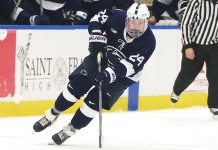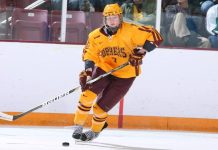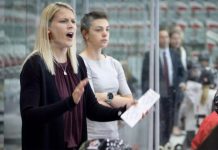Jeff Sauer, his eyes glistening as much as the two national championship rings on his fingers, faced a group of reporters and his friends, assistants and players, took a deep breath and explained why he thought this was the time to announce his retirement.
“I did talk to my dad last night, and he said this is a good thing,” the Wisconsin coach said, pausing in the middle to fight back tears, “so I feel very comfortable about it.”
— Jeff Sauer
It comes as no surprise to anyone who knows Sauer that the legendary college hockey coach would turn to his father for advice. Ted Sauer passed away in the fall of 1998, but he helped his son through what had to be one of the toughest moments of his coaching career.
Sauer said he is retiring as Wisconsin’s coach at the end of this season, ending a run that made him just as synonymous with the program as the legendary “Badger” Bob Johnson.
When the end of the season rolls around, it will be a full 31 years as a head coach for Sauer, the last 20 in Madison.
In those last 20 years, he has won two national championships, five WCHA playoff titles, made 12 NCAA tournament appearances, seen 17 players earn all-America honors and seen 27 of his players play in the NHL.
“The bottom line is, from my standpoint, it’s time,” said Sauer, the fourth-winningest college hockey coach with 647 victories. “I really feel comfortable with the fact that it’s time. Whether the impression is that I’m being shoved away and all that kind of stuff, I don’t look at it that way. I feel very confident in the fact that this is the right decision and it’s time to do that. You can take that and run with it, whatever you want. From my perspective, I’m comfortable with this.”
Word of Sauer’s retirement broke in Tuesday’s editions of the Wisconsin State Journal. Sauer was reportedly visibly upset when he arrived to the Kohl Center that morning for practice.
He said even his family didn’t know he was considering retirement until he told them Monday night. He expressed anger at Wednesday’s news conference at the way things were handled.
“I don’t think it was fair to me or my family the way this transpired,” said Sauer, who called the members of his coaching staff late Monday night to notify them of the events. “I thought I deserved better. That’s where I’m at with that.”
He added: “The thing that disturbed me the most was that I was not able to — I was not asked the specific question with enough time to not have this come out. Let’s put it that way.”
Sauer, 58, said his plan was to announce his retirement after the season, at the team’s banquet.
Most of the Wisconsin players learned of the coach’s retirement by reading the newspaper.
“The first thing I did to my team was apologize because my team found out about this in the newspaper, and that is not acceptable,” Sauer said.
Wisconsin athletics director Pat Richter, with whom Sauer said he had talked about retirement for a year and a half, said it was time to move on after the news leaked.
“We certainly can understand why Jeff is not happy about it,” said Richter, whose son Barry played for Sauer, “yet we’ve had a discussion since that time and I think once it happened there’s a certain feeling that we got it out and now we can go forward.”
Sauer is expected to enter an administrative position in the athletics department after the end of the season.
A 1965 graduate of Colorado College, Sauer started his head coaching career at his alma mater in 1971 after serving as an assistant to Bob Johnson at Wisconsin. He won the WCHA’s coach of the year award twice while at CC.
In the summer of 1982, he took over for Johnson at Wisconsin. His 647-523-55 overall record includes a 481-297-44 mark with the Badgers.
Sauer became emotional a handful of times during Wednesday’s news conference, including when talking about his players.
“As I told my team the other day, the only reason I’ve done this is because of them,” Sauer said. “I try to be a role model of some kind. In some cases, they look at me as kind of up on a pedestal and they’re afraid to come and talk. But I think most of the people know that my door’s always open.”
He added: “I just thank all the players [for] all the things that they have done for me, not only winning and losing and all that type of stuff, but just having a chance to be a part of their lives. I spent more time with them than I have with my own family in terms of growing up.”
Sauer did have a list of regrets, also, though he said there weren’t many from his career.
One was the 1992 NCAA championship game against Lake Superior State in Albany, N.Y. The Badgers lost 5-3, and as a result of some of his players verbally abusing the game officials, Sauer was suspended for one NCAA tournament game.
“We had the game won, we got ourselves into some penalty trouble,” Sauer said. “I have yet to ever watch the tape of the game. I’ve yet to watch the tape and see what people told me in terms of how the referee handled things. I think that scenario for a couple years there made it tough for us at Wisconsin to be successful. I think we had to really struggle to get ourselves back on track.”
He also noted a change in the program since it moved into the Kohl Center in 1998. The building seats about 7,000 more than the team’s former home, the venerable Dane County Coliseum, but the team has to share it with the school’s men’s and women’s basketball teams.
With only occasional practice time at the Kohl Center, the Badgers practice for the most part at the rink adjacent to the Coliseum, about two miles from campus.
“I think we, right now, are probably in the worst practice facility within the league in relation to some of the other schools,” Sauer said. “I think moving to the Kohl Center has been great from a fan’s standpoint and from an attendance standpoint and all of that, but we’ve lost the home-ice advantage, and it’s difficult.”
Sauer also lamented that the school, in his eyes, focuses on football and basketball first.
“Bob Johnson told me walking the mountains the day before I left to come here that you’re going to find that Wisconsin is still a basketball-football school,” Sauer said. “And I haven’t seen that change over the course of time.”
The school isn’t expecting the search for Sauer’s successor to be a quick one. While names like Denver’s George Gwozdecky, Nebraska-Omaha’s Mike Kemp and Wisconsin assistant coach Mark Johnson — all of whom have ties to the school — have been thrown into the mix as fodder for discussion, Richter said he doesn’t anticipate a hire before the end of the hockey season.
“We really haven’t even started on that,” Richter said. “Obviously, there are going to be people who are going to contact us, but I guess as a general statement, what I would say is we probably wouldn’t expect to have someone until after the Frozen Four, just because there could be coaches that are going to be involved in the tournament. As a general statement, I would say that there shouldn’t be anything definitive until that time.”
Richter also noted that having ties to the university may not improve a candidate’s chances.
Sauer advised Richter that he’ll get a “stack of three, four hundred” resumes to sort through. He said he doesn’t expect to have direct input on the coaching search, but thinks his opinion will be solicited at some point.
Sauer thanked a number of people, including his current and former staff members, in his 40-minute speech in the Kohl Center’s media room.
He was asked what he hoped others would remember about his contribution to Wisconsin hockey.
“Success, we were able to win. Integrity over the course of time,” Sauer said. “Just being a good person. That’s really what it’s all about. My philosophy, coaching-wise, is to recruit good players, give them the ability to express themselves on the ice. Some years it’s bitten me in the tail, but try not to structure too much. Let them be themselves, be creative, let them have success.
“It’s the fun of the game. It’s the ultimate team game. You can’t do this with one person, and that’s why I’m not the guy that’s responsible, everybody’s responsible.”


